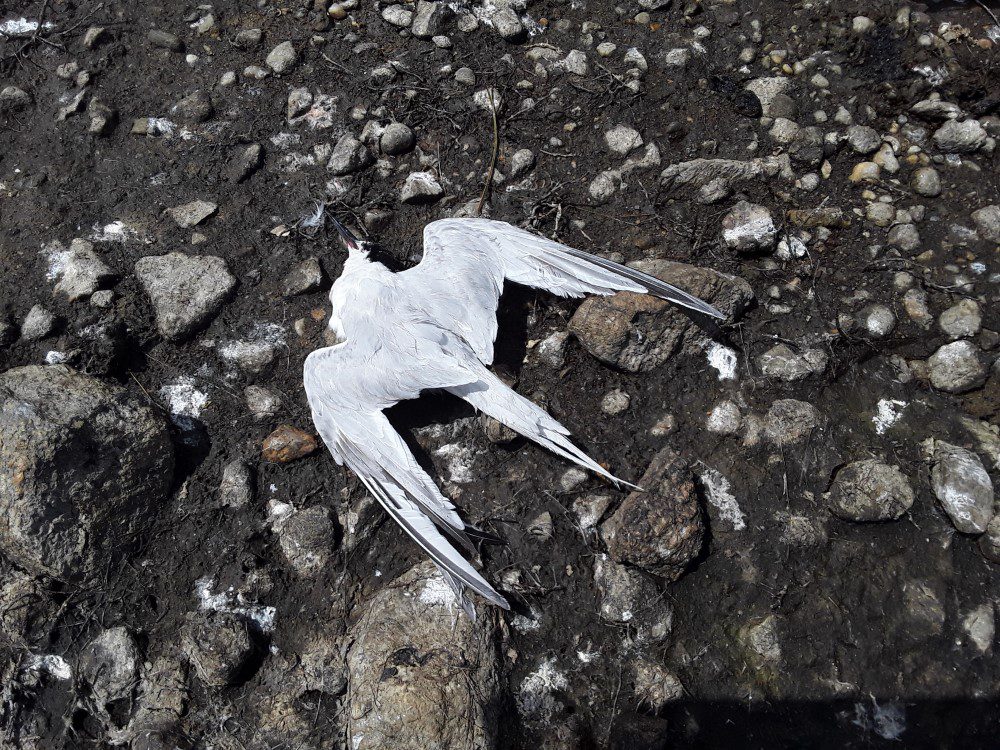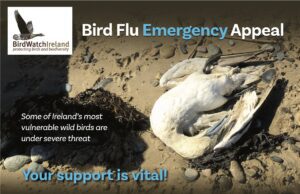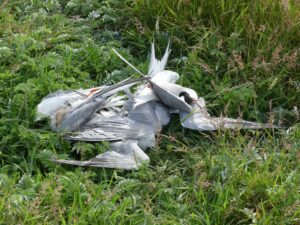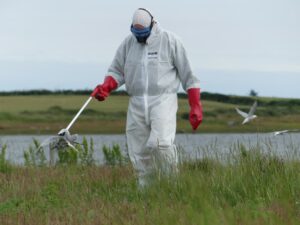BirdWatch Ireland staff have been dealing with alarming and unprecedented outbreaks of the highly pathogenic H5N1 strain of avian influenza, or bird ‘flu, at some of Ireland’s most important seabird colonies. Over the past few weeks, the carcasses of hundreds of dead seabirds, both adults and chicks, have been recovered for disposal, in an effort to try to prevent further spread of this highly contagious viral disease. There are fears for the long-term devastating consequences this outbreak may have on Ireland’s seabird populations, which are of international importance.
During the current nesting season, the hardest hit birds have been members of the tern family, a group of migratory seabirds which visit Ireland each summer to breed. All five of Ireland’s breeding tern species are ‘Amber-listed’ species of conservation concern, meaning that their populations were already been identified as being at risk before the current disease outbreak.
Please click here to donate to our Bird ‘Flu Emergency Appeal
Last summer, seabird colonies across Ireland, Britain, Europe and other parts of the world were severely impacted by the same H5N1 strain of bird ‘flu, in what was the worst global outbreak of this disease in history. Populations of the Gannet, Ireland’s largest breeding seabird species, were particularly hard-hit: please click here for more details. Elsewhere in Europe, large numbers of terns perished at their nesting colonies. Our Irish tern colonies were not impacted last summer, but unfortunately it seems that their luck has run out this year.
BirdWatch Ireland manages the four most important tern colonies in Ireland. Monitoring and conservation at Lady’s Island Lake (Wexford), Rockabill Island (Dublin) and Kilcoole Beach (Wicklow) is in conjunction with, and funded by, the National Parks and Wildlife Service, and our work on the Dublin Port Tern colony is funded by Dublin Port Company.
Although it is still too early to assess the full impacts on populations, at the time of writing more than 160 adult Common Terns, along with over 450 Common Tern chicks, have been found dead at the breeding colony at Lady’s Island Lake, with the disease now also threatening the populations of Sandwich Terns and Roseate Terns that also nest there. The disease has probably spread from the earlier-nesting Black-headed Gulls also present at the same location, which hosts the species’ largest colony in Ireland.
Dead terns at Lady’s Island Lake, Co. Wexford: victims of bird ‘flu
(Photo: BirdWatch Ireland)
Lady’s Island Lake and Rockabill Island are home to the two largest mixed-species tern colonies in Ireland, with the latter holding 1,750 pairs of Roseate Terns. This means that it is, by far, the largest and most important breeding colony for this threatened species in all of Europe, holding approx. 60% of the European population. A large-scale outbreak of bird ‘flu in this colony would have disastrous repercussions for Roseate Terns at an international level.
Since 1st July, a small number of adult Common Terns have been found dead or dying on Rockabill Island. Unfortunately, the carcasses sent to the Department of Agriculture, Food and the Marine for analysis have tested positive for bird ‘flu.
BirdWatch Ireland fieldworker wearing PPE, collecting bird ‘flu victims
(Photo: BirdWatch Ireland)
These outbreaks are very worrying for the future conservation of our tern species. A poor breeding season at a tern colony, with few chicks surviving, is unfortunate, but can be compensated for by better breeding success in subsequent years. However, the deaths of large numbers of adult terns of breeding age has a much bigger impact, and recovery will take a long time. BirdWatch Ireland will continue to monitor these outbreaks and remove carcasses, wherever it possible to do so safely. Experience from seabird colonies elsewhere in Europe last summer has shown that carcass removal is a key action to minimising the spread of avian influenza.
*********************************
All of us at BirdWatch Ireland would like to extend our heartfelt thanks and appreciation to everyone who has donated to our Bird ‘Flu Emergency Appeal to date. The funds raised have been an enormous help in covering the cost of specialist personal protective equipment and training for our tern colony wardens. When faced with a crisis such as this one, we depend heavily on the generosity of our members and supporters, and your support has been vital in minimising the impacts of this terrible disease and keeping our wardens safe.
If you wish to donate to BirdWatch Ireland’s Bird ‘Flu Emergency Appeal, please click here.
*********************************
We would like to remind the public not to touch any sick or dead seabirds, but to report them via BirdTrack and the Department of Agriculture’s ‘Avian Check’ web page.
If you own chickens or other poultry then please consult the Department of Agriculture website for further advice.





